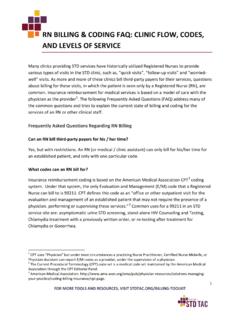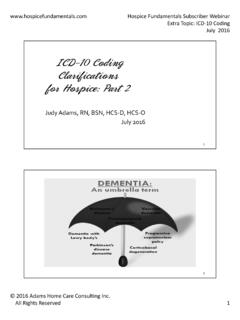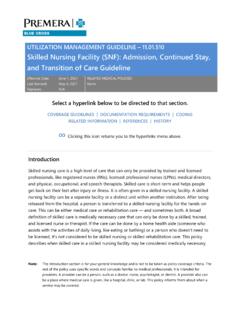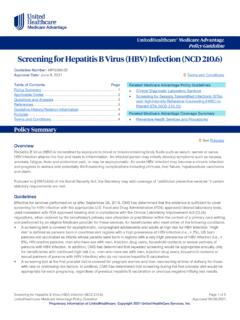Transcription of Advance Care Planning Billing Resource Guide
1 1 Materials developed by Respecting Choices . Copyright 2018 GLMF, Inc. All rights reserved. RC CM Advance Care Planning Billing Resource Guide Historically, physicians have understood the necessity and benefits of Advance care Planning (ACP) conversations with patients. The challenges of a busy clinic schedule, the time-intensive nature of these conversations, and lack of reimbursement add to the barriers of offering a standard process of ACP for all patients. The good news is that the Centers for Medicare and Medicaid Services (CMS) now recognize the value of ACP conversations and how the exploration and integration of a patient s goals, values, and preferences into medical plans supports person-centered decision making and provides a person-centered care experience that honors and respects an individual s treatment preferences. This ACP Billing Resource Guide will focus on the specific information to successfully deliver, report, document, and bill for ACP services.
2 In January 2016 , Medicare adopted and began reimbursement for Common Procedural Terminology (CPT) codes that describe Advance care Planning services. Physicians and qualified health professionals (any provider who has a National Provider Identifier [NPI], , advanced practice nurse, physician assistant, and licensed clinical social worker) need to understand how, when, and what to cover during an Advance care Planning conversation as well as how to report the appropriate CPT codes. Respecting Choices disclaimer: The content in this Resource Guide is a high-level overview of Medicare and Medicaid coverage of Advance care Planning CPT codes (current as of its published date) and does not guarantee payment. Individuals and organizations should consult with their Regional Medicare Intermediary, health plans, and compliance/ coding departments to learn the specifics of Advance care Planning CPT code reporting, Billing , and reimbursement.
3 General Use of Medicare ACP Billing Codes ACP Billing code definitions (see Table 1) CPT Code 99497 Advance care Planning including the explanation and discussion of Advance directives such as standard forms (with completion of such forms, when performed), by the physician or other qualified health care professional; first 30 minutes, face-to-face with the patient, family member(s), and/or surrogate CPT Code 99498 ..each additional 30 minutes Time-based reporting The codes for reporting ACP services are time-based. Use CPT code 99497 for the first 16 to 30 minutes. Use CPT code 99498 for each additional 30 minutes. There are no limits to the length and number of times you can report ACP CPT codes. The time reported must have been spent in person, face-to-face with the patient and/or surrogate. CMS defines a surrogate as a healthcare agent, designated decision maker, family member, or caregiver. If a patient is unable to be present, ACP documentation should reflect the reason why the patient is unable to participate, , patient has advanced dementia or is sedated on a ventilator.
4 2 Materials developed by Respecting Choices . Copyright 2018 GLMF, Inc. All rights reserved. RC CM Relative Value Units (RVUs) assigned to ACP CPT codes Relative Value Units or RVUs assigned to Advance care Planning CPT codes are: RVUs for CPT code 99497 RVUs for CPT code 99498 Reimbursement amounts for Advance care Planning conversations vary by region in the United States. Check with your organization s Billing department to determine the reimbursement for your practice. Billing Non-Medicare Payers To understand Advance care Planning reimbursement outside of Medicare and Medicaid, and the implications for patient financial responsibility, individuals and organizations should consult with each payer and health plan as needed. The content for this Resource Guide is based upon the most recent Advance care Planning Billing information found at the CMS website, 1,2 Common questions about the general use of ACP CPT codes Who can bill for ACP services?
5 Physicians, Advance practice nurses, physician assistants, and other licensed professionals who are authorized to independently bill for Medicare Part B services can report Advance care Planning CPT codes. In what place of service can ACP conversations be reported? Advance care Planning CPT codes can be reported when services are provided in any care setting including an office, hospital, skilled nursing facility, home, and via specific CMS guidelines for telehealth. You must include the Place of Service (POS) when reporting the CPT codes. Note: Special considerations are needed for: 1. Hospice For patients receiving hospice benefits, ACP services can be billed under Medicare Part B only if the physician is not employed by the hospice. If the attending hospice physician or nurse practitioner is employed by the hospice agency, then the ACP services are considered included under the Medicare Part A hospice benefit. 2.
6 Federally Qualified Health Centers and Rural Health Clinics These settings are paid under a special all-inclusive rate or prospective payment system (PPS) in which ACP is part of the bundled services. 3. Program for All-Inclusive Care for the Elderly (PACE) A community-based Medicare and Medicaid program that provides coordination to an integrated healthcare service for frail elders. PACE can report ACP codes but has not received guidance on the process at the time of this writing. 1 Advance Care Planning MLN Fact Sheet (June 2018) 2 Frequently Asked Questions about Billing the Physician Fee Schedule for Advance Care Planning Services. (July 2016 ) 3 Materials developed by Respecting Choices . Copyright 2018 GLMF, Inc. All rights reserved. RC CM When may ACP CPT codes be reported? You may report Advance care Planning CPT codes in the following situations: Advance care Planning is the primary service delivered in a patient visit.
7 These code(s) can be used alone. Evaluation and Management (E/M) and Advance care Planning services can be provided on the same day. Both codes should be reported with modifier-25 added. Advance care Planning can be reported during a Medicare Annual Wellness Visit (AWV). The AWV CPT code should be reported with modifier-33 added to avoid a patient copay. Advance care Planning services can be reported on the same day as Transitional Care Management (TCM) and Chronic Care Management (CCM) services. Note: Advance care Planning CPT codes MAY be reported by another practitioner ( , primary care physician or palliative care consultant) on the same day critical care services are reported by a critical care practitioner. When are ACP CPT codes NOT allowed to be reported? Do not report Advance care Planning services when: ACP services are 15 minutes or less. ACP services are part of a cognitive impairment evaluation(G0505).
8 Critical care services (99291-99292) are reported by the same qualified health professional on the same day. Note: ACP CPT codes MAY be reported by another practitioner ( , primary care physician or palliative care consultant) on the same day critical care services are reported by a critical care practitioner. How often can ACP CPT codes be reported? There are no limits to the number of times ACP can be reported. NOTE: ACP codes reported more than once a year for the same patient should be linked to the rationale for frequent ACP services such as: Changes in clinical status Uncertainty in prognosis Significant distress in decision making Change in goals, level of care, or treatment preferences When will patients have a copay for ACP conversations? Patients will have a copay any time the service is provided outside of the Medicare AWV. When can ACP CPT codes be reported using incident to reimbursement for non- Billing health professionals ( , social workers, registered nurses, etc.)
9 ? Advance care Planning services are often best delivered using a team-based approach. ACP conversations delivered by individuals other than a physician or qualified health professional can be reported using incident to Billing guidelines. Incident to is defined as: A physician s professional services or supplies that are furnished as an integral, although incidental, part of the physician s personal professional services in the course of diagnosis or treatment of an injury or illness. Incident to Billing is only applicable to Medicare. Individuals and organizations should consult with their Regional Medicare Intermediary, health plans, and compliance/ coding departments to learn if incident to Billing is recognized by Medicaid and other carriers. 4 Materials developed by Respecting Choices . Copyright 2018 GLMF, Inc. All rights reserved. RC CM Incident to ACP reporting should follow CMS guidelines:3 A qualified health professional (physician, advanced practice nurse [APRN], physician assistant [PA], other licensed professional) who has an NPI and is qualified to bill Medicare Part B, must initiate and establish care before using incident to ACP reporting.
10 ACP services can be provided by a physician but are delegated to a capable non-physician employee. The delegate must be an employee of the physician group/practice. ACP services must take place in a non-institutional setting and billed with Place of Service (POS) 11 (freestanding clinic or office, not home). Incident to reporting CANNOT be used in a hospital, skilled nursing facility, home/domiciliary setting, or hospital outpatient department (HOPD). A qualified health professional under whom the ACP service will be billed must be immediately available to provide direct supervision and address ACP questions as needed. They do not need to be the health professional who ordered the ACP services. If ACP services meet incident to requirements listed above, the only time that needs to be counted is that of the delegated employee. There are no specific time requirements for the Billing physician or other qualified health professional.





